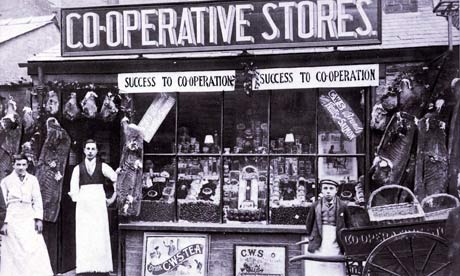Cooperatives embody the values of sharing: distributed risk, common purpose, shared rewards, and solidarity. They are an avenue to stable employment in a tumultuous job market. Ranging from factories to bakeries to cleaning services to buyers clubs, cooperatives offer a new way to structure enterprises that place value in the hands of all of those involved in creating it.
And they benefit society as a whole too, as evidenced by a February, 2014 report "Benefits and Impacts of Cooperatives" by Jessica Gordon Nembhard at CUNY. According to Nembhard, cooperatives:
1. Address market failure
Cooperatives do things markets won't do but people still need, like rural electricity, access to affordable housing, health care, child care, and healthy, affordable food.
2. Overcome historic barriers to development
By aggregating resources, cooperatives make it possible for enterprises to start that otherwise would not have been able to start via bank loans or other common financing methods.

3. Contribute an estimated 2.1 million jobs and $154 billion to the nation's economy
Yes, you read that correctly. That's equivalent to 3 Rhode Islands.

4. Fail less often than traditional corporations
Cooperatives don't get too big to fail, and they do so far less frequently than other kinds of businesses; 90 percent are operating after 5 years versus 4-5 percent of traditional corporations.

5. Promote economic stability
Cooperatives are community-based; they tend not to leave for greener pastures (or seek exorbitant tax abatements in exchange for creating jobs).

6. Foster tax-paying, civically-minded community members
Coops and their members are good citizens; they pay their taxes, support local charities, and pay fair wages.

7. Foster higher-than-average wages
Members in WAGES in Oakland, CA, a housecleaning coop, make over the national average and nearly twice their non-coop counterparts annually.

8. Strengthen local economies
Coops take local to heart; they buy local, sell local and employ local. For every $1,000 spent at a food coop, $1,606 goes into the local economy.










